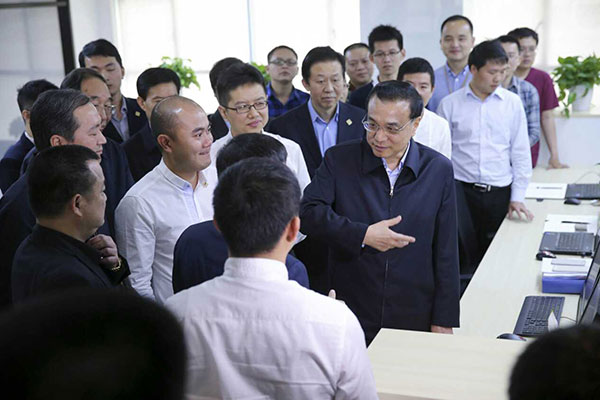
Worrying about the challenges faced by traditional industries, in particular the textile sector, has made Premier Li Keqiang lose his appetite, the Premier revealed on April 23.
He made the remarks during a visit to an e-commerce company specializing in the garment trade in Quanzhou, a major manufacturing base in Fujian province.
Premier Li told an executive at a garment manufacturer that he feels “anxious” when thinking about the difficulties facing the textile and other traditional manufacturing industries, and added, “Sometimes I can’t eat.”
Premier Li said that during Chinese New Year, one of his friends bought four pairs of cotton socks for 10 yuan ($1.61).
“How could the company cover its costs at such a low price?” he said. “Was it because some manufacturers have to make big price cuts to overcome financing difficulties?”
Pin Shang E-Commerce, an Internet-based platform providing sales and buying information for garment manufacturers, started to offer short-term financing last year.
One garment processing company borrowed more than 3 million yuan from the platform at an annual interest rate of 7.5 percent — much lower than the rates offered by banks — after signing a multimillion-dollar deal with a manufacturer via the platform.
Lin Hongnan, president of the e-commerce company, said, “Risk control is possible since we are able to track their record of transactions on the platform.”
Garment and shoe manufacturing companies usually receive payment months after they deliver products, but have to pay for materials and labor in advance, he said.
The tour also took the premier to J-tech CNC Machinery, a producer of computerized numerical control equipment.
Yan Zhihuang, Quanzhou Science and Technology’s bureau chief, said rising labor costs and environmental concerns have compelled equipment producers to upgrade their machinery to protect the rights of workers and reduce damage to the environment.
“Streamlined automatic shoe rubber coating equipment can replace up to 10 workers, which greatly reduces labor costs and eases labor shortages,” he said.
“Upgraded equipment also enables manufacturers of sanitary ware and hardware — an industry that used to involve long exposure to dust during the coating process — to improve their working environment,” he said
“The upgraded industrial model has saved Quanzhou from a deeper decline in the traditional industries caused by shrinking international orders and rising labor cost,” he added.
